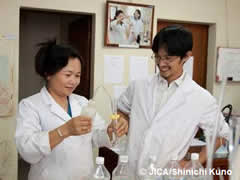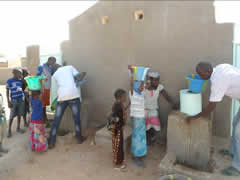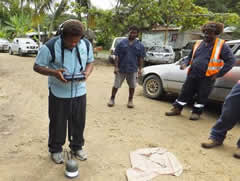1. Contributions for Achieving SDGs
Since the international community has the SDGs as common development goals and targets for 2030, JICA's vision for the cooperation in the water resources sector is to contribute for the achievement of the SDGs.
The commitment of "no one left behind" raised by the SDGs is consistent with JICA's mission of "human security", which means focusing on individual people and building societies in which everyone can live to enhance human fulfillment by protecting and empowering individuals and communities that are exposed to critical and pervasive threats to human lives, livelihoods and dignity. This is also consistent with the Japan Development Cooperation Charter, which embraces the philosophy and priority policies such as the concept of "human security", "quality growth", and inclusive and equitable development.
In terms of the eight targets set for Goal 6, JICA is particularly active in cooperation in water resources sector (1)6.1"achieving universal and equitable access to safe and affordable drinking water for all", (2)6.2"achieving access to adequate and equitable sanitation and hygiene, and ending open defecation", (3)6.4"improving water-use efficiency and reducing water scarcity through sustainable withdrawals", and (4)6.5"promoting integrated water resources management".
2. Focus Areas
The focus areas on the five sub-sectors, (1) urban water supply, (2) rural water supply, (3) sanitation, (4) water use efficiency and (5) integrated water resources management, which align with the four priority targets described above, are as follows.

Cambodia
Japan Overseas Cooperation Volunteer working with a water quality inspector
(1) Focus Areas in Urban Water Supply (related to SDGs Target 6.1)
In the field of urban water supply, JICA will aim to not only expand access to safe drinking water, but also to raise service levels to provide drinking water sustainably and at an affordable price from an improved water source which is located on premises, available when needed and free of faecal and priority contamination. Also, in emphasizing the point of "achieving universal and equitable access" under SDGs Target 6.1, JICA will pay special attention to the access of the vulnerable within target areas.
To meet the increasing demand for infrastructure development in urban areas, augmented by population growth, urbanization and people's desire for higher service levels, it is necessary to secure funding sources for major capital investments. This requires not only public funding and development assistance, but also private sector participation. The premise for securing such funding is consistent national water policies and the sound management capacity of water utilities, which form the basis of creditworthiness. Depending on the development stage of the country and the target water utility, JICA supports the expansion of revenue bases by infrastructure development through financial cooperation, and the capacity development which comprehensively addresses not only individual but also institutions and society through technical cooperation. JICA also promotes the autonomous procurement of funding, including private funds and private sector involvement as capacity increases.
Also, to ensure long-term sustainability, it is important for water utilities to be able to recover costs by collecting water tariffs. JICA, with careful consideration for the social background of each region, will emphasize the beneficiaries-pay principle, whereby water utilities are basically autonomous with self-support accounting which operate based on the payment of tariffs by beneficiaries.
In the support of urban water supply, JICA will strengthen cooperation among industry, government and academia, including local governments, to actively utilize their expertise accumulated over many years in Japan.
(2) Focus Areas in Rural Water Supply (related to SDGs Targets 6.1 and 6b)
JICA will continue to take measures to improve access to safe drinking water in the field of rural water supply. As the need for cooperation in peri-urban areas and populated villages with thousands of people, there is a greater need for not only hand pump, but also piped water supply facilities with public taps and yard taps. JICA will be engaged in providing cooperation in those fields.
In doing so, JICA will provide a combination of support for the development of village-level operation and maintenance systems and the strengthening of government support systems such as sector monitoring, technical guidance and major repair, to support communities and community-based organizations in accordance with SDGs Target 6.b, as well as support for cost recovery through the collection of water charges, support for the private sector including repair mechanics and supply chain, and support for improved hygiene behavior and sanitation awareness. In these activities, the effectiveness of development will be enhanced through cooperation with related fields such as the health and education sectors, as well as with NGOs. Importance also will be placed on equitable access to vulnerable groups, through consideration of gender equality etc. in the active promotion of participation by women.
(3) Focus Areas in Sanitation (related to SDGs Target 6.2)
JICA will bear in mind that improvements in sanitation conditions have a mutually complementary relationship with the water supply sector due to the need for water to wash hands etc., and make efforts in cooperation with related sectors such as the health and education sectors including the installation of toilets in schools and health facilities, and JICA Volunteers activities aimed at raising awareness of hygiene and improving hygiene behavior.
For governments to be able to systematically and sustainably support community awareness activities and maintenance, support from policy and institutional perspectives will be provided in sector monitoring, the development of legal systems, strategies and plans, and the strengthening of relevant government agencies.
While being conscious that social and cultural considerations are essential in efforts aimed at improvements in sanitation, particular attention is given to the needs of women and girls, as well as the promotion of gender equality.
The SDGs include not only the use of toilets, but also the safe treatment and disposal of excreta. JICA will cooperate in the consideration of the total material flow of excreta, including the removal and disposal of sludge from septic tanks, and so on.

Senegal
Hygiene education activities at a school under "The Project for Water Supply and Improvement of Hygienic Conditions in Rural Areas"
(4) Focus Areas in Improved Water-use Efficiency and Sustainable Withdrawals (related to SDGs Target 6.4)
Japan's water utilities boast an average water leakage rate of less than 5% nationwide (2014), which is extremely low in comparison with other nations. Japan also has experience in various initiatives for conserving water at homes and industries. Making use of Japan's accumulated experience and know-how, JICA will support initiatives to improve water-use efficiency, such as the reduction of leakage and water-saving by introducing volumetric tariffs, etc. As water shortages are expected to become more serious, the formulation of data-based medium to long-term plans for water resources development and management and the development of monitoring systems for hydrological data etc., where JICA has shown success in past cooperation, will be even more important in the future. Going forward, JICA will continue to support the formulation and implementation of highly feasible master plans aimed at solving issues of water resources development, management and allocation, and the enhancement of monitoring capabilities, for the sustainable use of water resources from both water quantity and quality perspectives.

Solomon Islands
Training in leakage detection under "The Project for Improvement of Non-Revenue Water Reduction Capacity for Solomon Islands Water Authority"
(5) Focus Areas in Integrated Water Resources Management (related to SDGs Target 6.5)
To promote integrated water resources management (IWRM), it is necessary to use natural science and social science technologies in tandem. JICA has accumulated a great deal of experience in performing studies and projects in the use of natural science technologies such as the enhancement of monitoring and planning etc. for water resources development and management. In addition to working on such cooperation, JICA will also continue to actively utilize social science technologies to promote water related projects based on the problem analysis with clear understanding of the claims and interests of various stakeholders in various sectors, and based on social consensus.
To accomplish this, JICA will proactively work to: gain sufficient understanding of a project's target society, culture, and stakeholders; provide clear explanations of survey achievements based on natural science technology and share them among stakeholders; form a framework for the consensus formation process and promote it; improve legal systems applying common law and the interest adjustment mechanism; and consider appropriate methods for sharing the process and achievements of interest adjustment and consensus formation. In this way, by facilitating IWRM processes as a neutral catalyst for the local people, JICA will focus on strengthening the capabilities of central and regional administrative agencies to plan and coordinate.
In promoting IWRM at a national level, there is a need to support the formation of organizations, institutions, policies, plans and projects suited to each country. To do this, it is necessary to focus on a local level, or in other words, on the culture and customs of the local community, and to provide the foundation from problem analysis and lessons learned. Rather than the one-size-fits-all application of global standards, JICA will look to promote a practical approach to IWRM aimed at solving problems rooted in local governance.
3. News
- JICA has created a lecture video "How has Japan Achieved Universal Access to Safe Drinking Water?" by Prof. Satoshi Takizawa of the University of Tokyo. (2022-10-07) (external link: YouTube)
- Video "Japan's Waterworks: Progress Made Since the Implementation of Yokohama Waterworks" (external link: YouTube)
- JICA's assistance 'visible' in Palestine after 4 years of partnership to improve water services in Jenin (2021-07-14)
- JICA Staff published a paper "Practicality of Integrated Water Resources Management (IWRM) in Different Contexts" in the International Journal of Water Resources Development (2021-05-20) (external link)
- JICA Delivers Water Treatment Products To SEG To Fight Against COVID-19 And Ebola (2021-03-29)
- COVID-19 Emergency Support to the Water Sector in South Sudan (2020-08-26)
- Chlorine Procurement for Water Supply in Palestine by JICA Urgent Support (2020-07-31)
- Emergency Support for COVID-19 Infection Control Measure in Sudan (2020-07-27)
- Continuing Supply of Disinfected Safe Water throughout Tajikistan (2020-07-20)
- Possible Countermeasures by Water Utilities against COVID-19 (2020-06-03)
- Water Finance Facility and JICA Sign Memorandum of Cooperation to Foster Cooperation on Blended Finance (2020-03-23)
Related Links
- Position paper (JICA's Cooperation Strategy For Water Resources Sector) (English) (PDF/5.48MB)
- Executives Leaders of Water Utilities from 13 Asian Countries Discuss Sustainable Water Service on August 1-4, 2017 in Yokohama
- Japan's Experiences on Water Supply Development March 2017 (English) (PDF/18.6MB)
- Handbook on Climate Change Adaptation in the Water Sector - A Resilient Approach that Integrates Water Management and Community Development - March 2010 (English) (PDF/1.69MB)




scroll